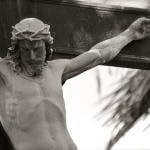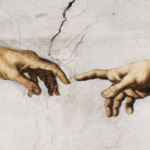No doubt, there will be a great deal of foolish behavior on display tonight as people welcome in the New Year. For others, a joyful solemnity will mark the occasion.
For some, the solemnity includes remembrance of Jesus’ circumcision. In the church calendar, obedience marks tomorrow, as various Christian communities celebrate The Feast of the Circumcision of the Lord.
The biblical background for the Feast of the Circumcision of the Lord is the account of Jesus being circumcised on the eighth day after his birth in keeping with the Mosaic Law (Luke 2:21). This was necessary for him as a physical descendent of Abraham (Genesis 17:10-13) and in the quest to fulfill all righteousness and redeem those under the law (Galatians 4:4-5).
I have read that the Orthodox Church celebrates the Feast of Circumcision with an all-night vigil beginning on December 31st. In discussing the importance of this feast, one Orthodox site reads,
It is truly a pity that the profound symbolism of this Feast should be “lost” in the “worldly tumult” of the twelve-day period between the Nativity and Theophany, and particularly on New Year’s Day; and that we should lose, as well, an opportunity for us to enter more deeply into the “circumcision made without hands” of our Holy Baptism.
At the present time, the Roman Catholic Church celebrates the Solemnity of Mary, the Mother of God, on January 1st. In a discussion of The Feast of the Circumcision, a Catholic site states that
It is to be noted also that the Blessed Virgin Mary was not forgotten in the festivities of the holy season, and the Mass in her honour was sometimes said on this day. Today, also, while in both Missal and Breviary the feast bears the title “In Circumcisione Domini et Octav Nativitatis”, the prayers have special reference to the Blessed Virgin, and in the Office, the responses and antiphons set forth her privileges and extol her wonderful prerogatives.
More will appear on the Solemnity of Mary in a post tomorrow at this column. For now, I wish to emphasize that both celebrations highlight obedience. With this point in mind, it would be quite difficult to engage in debauched behavior tonight while preparing to honor the obedience of the holy family with holy feasting tomorrow.
Another feast that bears consideration at this juncture is the Feast of Fools, which was celebrated on January 1st for several centuries. A much debated topic, the following quotation from “Feast of Fools” at “Oxford Bibliographies” serves as a good definition (the article from which the quote is taken also provides a succinct historical overview and treatment of key sources; see also this related source; for an alternative treatment, refer here):
The Feast of Fools developed in the late 12th and early 13th centuries as an elaborate and orderly liturgy for the day of the Circumcision (1 January). Celebrating the biblical principle that “God chose what is foolish in the world to shame the wise” (1 Cor. 1:27), the feast allowed low-ranking subdeacons to assume leadership roles in worship, usually reserved for the bishop or the cantor.
Max Harris, the author of the “Oxford Bibliographies” piece on the “Feast of Fools”, writes that “the liturgical Feast of Fools” struggled for viability in the churches. Later scholarly treatments confused the Feast with “unrelated festivities of bourgeois confraternities of fools outside the churches” that had mushroomed at the same time. Such confusion prompted “considerable misreading of the older ecclesiastical records” and contributed “to the mistaken but widespread view that the Feast of Fools was little more than a disorderly clerical revel.” Harvey Cox goes so far as to write of the eventual disappearance of the Feast of Fools that
The Feast of Fools…had an implicitly radical dimension. It exposed the arbitrary quality of social rank and enabled people to see that things need not always be as they are. Maybe that is why it made the power-wielders uncomfortable and eventually had to go (Harvey Cox, The Feast of Fools: A Theological Essay on Festivity and Fantasy {Cambridge: Harvard University Press, 1969}, p. 5.).
Regardless of one’s take on the Feast of Fools, and whether or not one belongs to a tradition that celebrates the Feast of Circumcision, believers of every branch of the Christian family tree should at least consider these historical accounts and traditions. They have something powerful to convey on the radical nature of the Christian faith. The Lord of heaven above descended to earth, was born of the Virgin Mary, born under the Law, in the fullness of time. Jesus humbled himself in order to redeem those under the Law. He became a lowly servant, suffered and died, and rose from the dead, thereby overturning the world system of power and prestige. Christians are called to boast in the cross of Christ, which is foolishness and weakness, though it is the wisdom and power of God (1 Corinthians 1:18-31).
As we enter into the new year, we need to ponder in what and in whom we will boast. For example, will we boast about how much alcohol we had to drink and how foolish we acted at a New Year’s party? Or will we boast in the favor of the Lord from whose joyful cup of abundant sacrifice we have occasion to drink?
For more on the church year and its importance for the Christian imagination and approach to life, check out the sampler here at this link to my new book, Setting the Spiritual Clock: Sacred Time Breaking Through the Secular Eclipse. Here is the YouTube trailer for the book. You can get a 40% discount for the book if you order by January 31st at the publishing house website. Please be sure to use the discount code of ADVENT20 when placing your order. Happy New Year!













